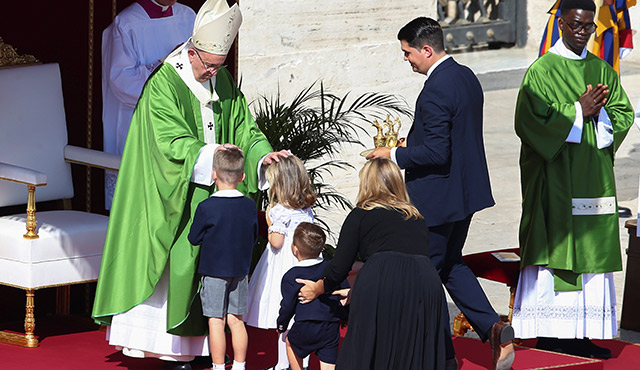VATICAN CITY (CNS) — Christians must put their mark on history, transforming the world every day driven by the joy of proclaiming God’s love, Pope Francis said.
“We are not prophets of gloom who take delight in unearthing dangers or deviations,” handing down “bitter judgments on our society, on the church, on everything and everyone, polluting the world with our negativity,” he told catechists Sept. 25.
Instead, “whoever proclaims the hope of Jesus carries joy” and can see both far-off new horizons and pressing needs under their nose, driving them to help and “go out from themselves to write history.”
The pope’s homily came during a special Mass for a Year of Mercy jubilee for catechists in St. Peter’s Square.
Nothing is more important for catechists — and all Christians who are likewise called to give witness and share God’s word — than to keep the core, essential message of the faith “front and center: the Lord is risen,” he said.
“The Lord Jesus is risen, the Lord Jesus loves you, and he has given his life for you; risen and alive, he is close to you and waits for you every day.”
“Everything in the faith becomes beautiful when linked to this centerpiece,” he said; from that proclamation all other teachings of the faith gain meaning and force, especially when Jesus’ commandment of loving one another is followed.
“It is by loving that the God-who-is-love is proclaimed to the world: not by the power of convincing, never by imposing the truth, no less by growing fixated on some religious or moral obligation,” he said.
Because God “is not an idea, but a living person,” Pope Francis said, he is proclaimed by an actual encounter with another person, accompanied by listening, welcoming and caring for the other’s past and journey forward.
Also, since God is love, goodness, joy and hope, then God must be proclaimed by living that way “in the present moment,” he said. “We do not speak convincingly about Jesus when we are sad; nor do we transmit God’s beauty merely with beautiful homilies.”
The pope highlighted the day’s Gospel reading in which Jesus tells the story of the poor man named Lazarus who went to heaven, while the rich man who ignored his plight, ended up in hell.
This parable in the Gospel according to Luke tells people “what it means to love,” the pope said.
The rich man did nothing overtly bad or evil, the pope said, he was just indifferent — an illness worse than whatever caused Lazarus’ sores.
The rich man suffered from being self-centered, materialistic and superficial, he said.
“This worldliness is like a ‘black hole’ that swallows up what is good and extinguishes love,” and anaesthetizes the soul, the pope said.
The rich man’s obsession with appearances also means he suffered from a kind of blindness that kept him from seeing anything that did not interest him.
This blindness makes people act “cross-eyed,” the pope said, with one eye looking “with adulation at famous people of high rank, admired by the world,” and the other shifted “away from the many Lazaruses of today, from the poor, from the suffering who are the Lord’s beloved.”
The rich man remains nameless and, therefore, forgotten in history, he said, while “Lazarus is the only one named in all of Jesus’ parables,” and is welcomed to the banquet in the divine kingdom.
“Whoever lives for himself does not write history,” Pope Francis said. “And a Christian must write history.”
With so much worldliness, indifference and selfishness in the world, he said, Christians “must go out from themselves to write history,” which means being disturbed by the pain they see and seeking ways to help without procrastinating or delegating the task to others.
Responding to a situation of need with “’I have no time today. I’ll help you tomorrow.’ This is a sin,” he said. The time given to help people now “is time given to Jesus; it is love that remains. It is our treasure in heaven, which we earn here on earth.”

